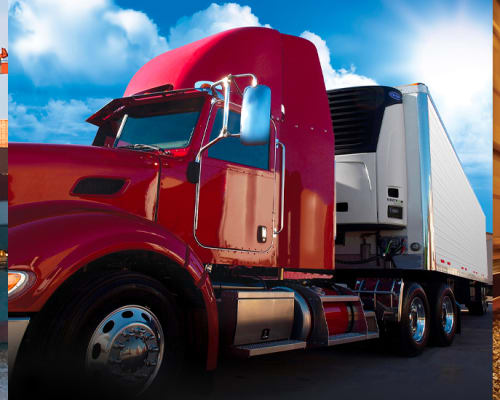Expert Tips for Selecting the most effective Refrigerated Truck Companies
A Detailed Overview of the Mechanisms Behind Refrigerated Vehicle Transport and Its Function in Food Safety
Refrigerated vehicle transport is essential in preserving food safety, utilizing sophisticated temperature level control systems and insulation technologies to protect disposable products throughout transit. The combination of advanced tracking systems ensures real-time oversight, allowing for immediate treatment in case of temperature level deviations. These important elements not just preserve the stability of food however additionally play an important role in protecting against foodborne ailments. Understanding how these systems work together raises essential concerns regarding their effectiveness and potential areas for improvement within the industry. What implications do these elements have for the future of food security?
Importance of Refrigerated Transportation
Cooled transport plays a crucial duty in maintaining the honesty and security of subject to spoiling products throughout the supply chain (transport refrigeration company). This specialized logistics system is necessary for maintaining the quality of food items, consisting of fresh produce, dairy products things, meats, and fish and shellfish, which are prone to spoilage when revealed to temperature level fluctuations. The capability to preserve a constant and regulated atmosphere ensures that these products maintain their nutritional value, flavor, and safety for customers
Additionally, cooled transportation decreases the dangers of foodborne diseases, which can occur from the development of dangerous microorganisms in incorrectly kept items. By adhering to rigid temperature level needs, companies not only abide by regulatory requirements however likewise foster customer count on and brand name reliability. The economic ramifications are substantial; minimized spoilage rates translate to reduced losses for stores and vendors, adding to overall productivity.
Furthermore, the raising international demand for top notch and fresh food products further emphasizes the significance of refrigerated transportation. As supply chains become a lot more complex and prolong globally, the need for efficient temperature-controlled logistics proceeds to expand, underpinning the entire food distribution network and guaranteeing that disposable items reach their locations safely and effectively.
Temperature Level Control Systems
Preserving optimum temperature level control is essential in the transport of disposable goods, and a variety of systems are utilized to accomplish this goal. Refrigerated vehicles use advanced refrigeration systems, primarily using vapor compression technology, which distributes refrigerant through evaporator and condenser coils to draw out warm from the freight location. This procedure ensures that the inside remains consistently cool, thus preserving the quality and safety of the items being transferred.
Furthermore, trucks are geared up with temperature monitoring systems that give real-time information on the internal environment. These systems commonly include digital sensing units and alarm systems to alert drivers in case of temperature fluctuations, enabling instant rehabilitative actions. Some cooled vehicles additionally feature programmable temperature level setups, permitting exact control customized to certain sorts of freight, such as veggies, fruits, or pharmaceuticals.
Additionally, making use of pre-cooling strategies prior to loading enhances the efficiency of temperature level control. By lowering the freight location's temperature level prior to the introduction of goods, the danger of temperature level spikes during transportation is reduced. These systems jointly add to a dependable cool chain, necessary for maintaining the integrity and safety and security of disposable food items throughout the transportation procedure.
Insulation Technologies
Insulation innovations play an essential role in boosting the effectiveness of refrigerated truck transportation by minimizing thermal exchange in between resource the freight location and the exterior atmosphere. Reliable insulation is essential for preserving the needed temperature level for disposable items, thus guaranteeing food safety and security and top quality throughout transit.
Typical insulation products used in refrigerated vehicles consist of polyurethane foam, polystyrene, and fiberglass, each providing varying degrees of thermal resistance. Polyurethane foam, understood for its exceptional shielding residential properties, is typically used as stiff panels that can be built to fit the vehicle's interior.

Advanced Surveillance Solution
To ensure the honesty of subject to spoiling products throughout transport, advanced surveillance systems have actually emerged as a crucial technology in the refrigerated vehicle industry - transport refrigeration. These systems use a mix of sensing units, data loggers, and real-time monitoring innovations to navigate to this site continuously keep track of temperature level, moisture, and total cargo problems throughout the trip. By supplying instantaneous comments on ecological variables, these systems enable prompt rehabilitative activities, thereby securing item quality
Modern monitoring systems are outfitted with wireless connectivity, allowing seamless information transmission to logistical hubs and stakeholders. This connectivity helps with remote surveillance, which is important for preserving compliance with market laws and criteria. Alerts can be created in real-time, informing operators of any type of deviations from pre-set limits, hence decreasing the threat of spoilage.
In addition, the combination of sophisticated analytics and artificial intelligence algorithms improves anticipating abilities, permitting much better preparation and threat evaluation. Historic data collected from these systems can notify future transport approaches, maximizing courses and lowering prospective dangers. Overall, the release of advanced surveillance systems represents a considerable development in the refrigerated transport market, strengthening the dedication to protecting the high quality website link and safety of disposable goods throughout their trip.
Influence On Food Safety And Security Specifications
The integration of advanced surveillance systems in chilled truck transportation has substantially influenced food safety and security standards throughout the supply chain. These systems enable real-time monitoring of temperature level, moisture, and various other critical criteria crucial for preserving the stability of subject to spoiling products. By making certain that products continue to be within specified temperature varieties during transit, these modern technologies alleviate the risk of microbial growth and spoilage, which are pivotal in food security.

The adoption of information analytics additionally permits proactive decision-making, making it possible for firms to determine possible problems prior to they intensify right into food safety violations. As an outcome, the unification of innovative surveillance systems not only boosts operational effectiveness but additionally promotes better responsibility in the food supply chain. This development underscores the crucial role of technology in raising food safety standards and guaranteeing consumer self-confidence in the products they obtain.
Conclusion
To conclude, chilled truck transportation is necessary for keeping food security via efficient temperature level control, progressed insulation modern technologies, and continual tracking systems. These systems work synergistically to preserve the high quality of disposable products and decrease the danger of foodborne ailments. Adherence to strict food safety and security criteria is achieved via the application of these technologies, highlighting the vital duty of chilled transportation in the food supply chain and its effect on public health and wellness.
Chilled vehicle transport is indispensable in preserving food safety, using sophisticated temperature control devices and insulation innovations to guard perishable items during transit - cold transport companies. Proper maintenance of insulation integrity, consisting of regular checks for wear or damages, is also essential to sustain the performance of refrigerated transportation systems and make sure compliance with food safety and security laws
The assimilation of sophisticated surveillance systems in chilled truck transportation has dramatically influenced food safety standards throughout the supply chain.In final thought, chilled truck transportation is crucial for preserving food security through reliable temperature level control, advanced insulation innovations, and constant tracking systems. Adherence to stringent food safety and security criteria is achieved through the execution of these modern technologies, highlighting the vital role of refrigerated transportation in the food supply chain and its effect on public health.